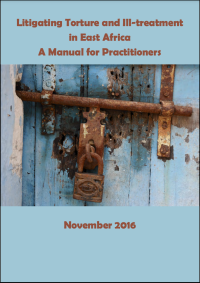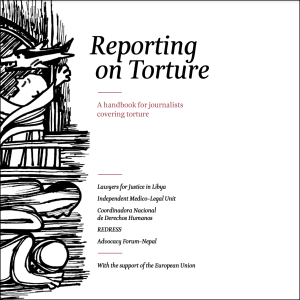Publications
REDRESS’ publications are also available in hard copy format. Please contact us for further information on [email protected].
Authored in collaboration with Barbara Maigari (JI Fellow) Partners West Africa-Nigeria and Legal Resources Consortium, this Commentary considers the challenges and opportunities present in the adoption of a comprehensive anti-torture bill in Nigeria, and offers concrete recommendations for its introduction to relevant stakeholders. Relying on interviews with national experts, a comprehensive literature review, and several consultative meetings, this report briefly outlines the practice of torture and ill-treatment in the Nigeria, and identifies shortcomings in the existing legal framework that need to be addressed in accordance with the country’s international obligations.
This report summarises the proceedings of the stakeholder roundtable organised by the Human Rights Center at the University of California, the International Center for Transitional Justice (ICTJ) and REDRESS, to assess how to best incorporate techniques of victim participation at the ICC and other comparative jurisdictions into the workings of Uganda's International Crimes Division (ICD). The ICD is the first domestic judicial body in Uganda to try international crimes, in particular war crimes, crimes against humanity, and genocide. Participants were made up of relevant actors of the ICD, experts on the implementation of victims’ rights at the ICC, and those working on the domestic implementation of victims’ rights in the United States and Kenya.
This manual seeks to assist those working to fight torture and to support victims through litigation in six countries in East Africa: Burundi, Kenya, Rwanda, South Sudan, Uganda and Tanzania. This region boasts a vibrant and active civil society that has advocated for the introduction of specific anti-torture legislation to create opportunities for litigation at domestic, regional, and international levels. Meanwhile, national lawyers have continued to use existing avenues to litigate against torture to secure accountability and justice for victims. This manual seeks to build on those efforts to offer a practical guide to the continuing development of a range of avenues for victims of torture and ill-treatment to obtain redress.
REDRESS and the African Centre for Justice and Peace Studies have made a joint submission to the All-Party Parliamentary Group on Sudan and South Sudan. The Government of Sudan remains non-complaint with its obligations pertaining to the absolute prohibition of torture, including accountability for torture by officials of the National Intelligence and Security Services (NISS) under the National Security Act of 2010. The UK government must develop a specific human rights strategy for its engagement with the Sudanese government. In particular, the UK government must make respect for human rights - particularly accountability for torture and ill-treatment - a key condition of any future engagement between the UK and Sudan.
In this brief, REDRESS provides an analysis of the victim participation framework enshrined in the International Crimes Division (ICD) rules adopted at the High Court in Uganda. The recommendations made herein are based on good practices identified by REDRESS in a study on victim participation in criminal proceedings across 22 countries. The aim of the recommendations is to support the ICD in ensuring that victims can exercise their rights to the fullest extent.
Du 12 au 13 Juillet 2016 s’est tenu dans la salle de conférence de JM Résidence à Bangui, un atelier sur la Cour Pénale Spéciale en République Centrafricaine co- organisé par Avocats Sans Frontières (ASF) et REDRESS. Cet atelier a connu la participation des acteurs judiciaires, des médias et des organisations de la société civile autour des questions relatives aux éléments clés et les prochaines étapes vers l’opérationnalité de la Cour Pénale Spéciale créée par la loi organique n°15.003 du 3 juin 2015.
This handbook aims to support and encourage journalists of varied experience to report on torture effectively. In doing so, we seek to assist journalists in the vital role they play in ‘breaking the silence’ around torture - a crime that thrives when perpetrators are left unscrutinised. Available in English, Spanish, Arabic, French and Nepali, this handbook addresses key questions about torture, including what it is, when it happens, why it happens, and what the consequences of torture are. It also provides guidance on how to interview torture survivors in an appropriate way. REDRESS authored the handbook jointly with Advocacy Forum-Nepal (AF), the Coordinadora Nacional de Derechos Humanos in Peru (CNDDHH), the Independent Medico-Legal Unit in Kenya (IMLU), and Lawyers for Justice in Libya (LFJL). It was launched on 26 June 2016, UN International Day in Support of Victims of Torture.
REDRESS has authored a joint submission with the Coalition Ivoiriènne pour la Cour Pénale Internationale (CI-CPI) and Lawyers for Justice in Libya (LFJL) to the International Criminal Court Prosecutor (OTP) on its new draft policy on how to select and prioritise cases. The submission calls on the OTP to ensure transparency in its application of the criteria set out in the draft policy, These comments follow a one-day consultation with civil society groups on the Draft policy, organised by the OTP in coordination with REDRESS, and a separate workshop organised by REDRESS with partners in the Ivory Coast.


